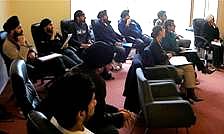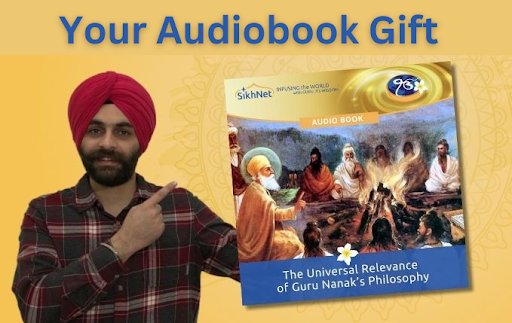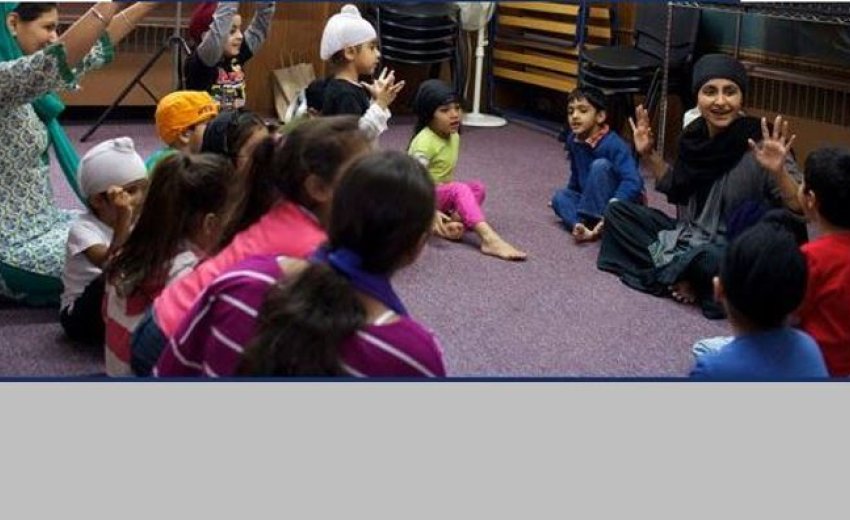The Sikh Research Institute (SikhRI) of San Antonio, Texas, was invited to the United Kingdom (UK) in March to present a variety of SikhRI educational programs and radio broadcasts to the Sikh Community in the UK.
In Glasgow, Scotland, SikhRI put on a Mark of Excellence (MOE) program entitled, “Asa ki Var: Beyond Duality,” on March 22, 2008. The MOE focused on structure and significance of Asa ki Var and interpretations on transcending duality in thought, action and society. Jas Kaur reflected on the day saying that it was “very inspiring, [it] made me view Sikhi in a different view. I listen to Asa ki Var regularly but never sat and thoroughly took time to learn and understand what Guru Ji's message actually is…..was definitely worthwhile".
In Southall, Middlesex, UK, SikhRI facilitated youth development and training through a MOE program entitled, “The Guru: Connecting with the Divine Light.” SikhRI presenters during the March 24th event were Harinder Singh and Ryan Singh Kohli. The Southall MOE sessions focused on understanding the role and importance of the Guru, historical narratives about the attributes and contributions of the Ten Nanaks, and the co-existence of the dynamic Guruship of the Granth-Panth. Jagdeep Singh Gill, the UK coordinator for SikhRI who organized all the events noted that, “The Mark of Excellence series, with its wide variety of themes, is specifically designed to impart the Sikh perspective to meet the needs and desires of specific audiences. Essentially, participants attend personal and community development sessions that seek to foster the Sikh values based on Gurmat traditions: Sikh scripture, history, and discipline.”

The Southall MOE program was hailed by Dr. Parvinder Singh Garcha, General Secretary of Sri Guru Singh Sabha, Southall, because of “…its unique approach of presenting Gurmat ideals in language that connects with today’s youth.” Jaswant Singh Bhangu from London, after attending the MOE session, remarked, "Today has been insightful, engaging and left me with the tools to approach questions regarding Sikh philosophy with a renewed vigor and confidence.”
When asked about the purpose of the Mark of Excellence programs for youth, Harinder Singh, Executive Director of SikhRI said, “Sikh ideology and lifestyle revolutionized the South Asian communities for five centuries. Now we see Sikhi being reduced to dogmas, not a life-changing phenomenon. We are trying to share the original freshness of Sikhi with the youngsters so they have enough information to make thoughtful decisions, so they feel connection to the Gurus. And hopefully some become activists, the foot soldiers, in Guru Nanak Sahib’s revolution.”
Harinder Singh was also a guest commentator on Punjab Radio Sky Channel 0130 on March 27th and 30th in Hayes, London, UK. The shows hosted by Jasvir Singh were titled “Sikhi Education.” and “Hola Mahalla”. Harinder Singh has made regular radio appearances in the past two years and continues to bring his message of the need for Sikh engagement and leadership in current social problems. Dr. Savi Singh Arora of Sikhwithin.com podcast hosted Harinder Singh for an episode. The podcast can be listened to at sikhiwitin.com. On March 30, 2008, in a presentation entitled, “The Gurduara – Then And Now.” Harinder Singh addressed the Central Gurdwara (Khalsa Jatha) in London, UK. His talk compared and contrasted elements of Sikh worship in the time of the Gurus and in modern times.
A major SikhRI event in the UK occurred
on March 29, 2008, with a full day’s teacher training program for
Gurmat and Pañjabi school teachers in the Sojhi elementary school
curriculum developed by SikhRI. “Along with sharing Sikh ideology with
youth, we provide tools for educators who are responsible to impart
Sikhi to students at Gurmat and Pañjabi schools across the globe,” says
Jasmine Kaur, Director of Education of SikhRI and Sojhi project lead.
Sojhi – Gurmat and Pañjabi Education Resource, was developed to
increase the effectiveness of Sikh education by developing high
standards of learning with comprehensive teaching materials. The Sojhi
team consisting of over 15 full-time, part-time and volunteer staff
members combined are developing a comprehensive education plan for Sikh
schools and students from Kindergarten to Grade 12. The Sojhi
elementary school curriculum introduces children to Gurmat-based
vocabulary and contemporary Pañjabi, as well as Sikh heritage with a
focus on the Sikh theological framework from 1469 to present.
After developing a set of standards for
Kindergarten to Grade 12 in 2005, the Sojhi elementary school
curriculum was introduced in June, 2006. Since then, 33 community and
private schools have adopted the curriculum and are currently
implementing it. Sri Guru Singh Sabha, Southall, UK is the most recent
organization to adopt the Sojhi curriculum for their volunteer-aided
Khalsa School that is scheduled to open in September 2009. The Khalsa
School team realized the need to implement an effective Sikh core
curriculum focusing on Boli (language arts) and Virsa (Sikh Heritage).
As a result, they invited members of the Sojhi team to train their
teachers on the effective implementation of the elementary school
curriculum. Jasmine Kaur and Harinder Singh developed sessions in
content and instruction and trained teachers from four schools besides
Sri Guru Singh Sabha’s team. These schools were Khalsa Punjabi Sunday
School, Slough; Ramgarhia Sikh School, Southall; Punjabi School,
Bradford and Punjabi After School, Southall.
The Sojhi curriculum nurtures skills that
children learn through their educational curriculum. Students using the
curriculum will have the opportunity to enhance skills that they learn
in their regular education classes. Developmental milestones and
abilities have been taken into account while developing the curriculum.
For example, at a 2nd grade level children are typically developing map
reading skills. In the Sojhi curriculum similarly, as students begin to
learn about the land of our Gurus, they begin identifying districts and
provinces of East and West Pañjab. This helps them improve their map
reading skills through content-guided practice. Of note, the Sojhi
curriculum also focuses on developing leadership skills at a young age.
Typically, a training session consists of interactive workshops in
which teachers are introduced to key teaching techniques including
effective questioning, developing lesson-related graphics, and the
realizing the importance of detailed planning and preparation to teach
in the classroom. Foundational understanding of Sikhi is provided
through workshops with titles such as: Sikh Culture and Traditions,
Sikh Celebrations, Language: Spelling, Parlance and Vocabulary and The
Ten Nanaks: One Jot. Sojhi also provides second level customized
trainings for schools adopting the curriculum. The instructional
training workshops are highly customized to the needs of the specific
school staff members, whether in content or teaching techniques.
Teacher comments continue to be
enthusiastically positive. For example, Mohinder Kaur of Bradford
said……….”very interesting, informative and useful program, particularly
how it links a Sikhi and Gurbani perspective. A very good mechanism to
increase Sikhi and Gurbani based knowledge in youngsters. Lesson plans
are user-friendly, flexible, and relevant and so can be adapted to suit
the different institutions.”
As Sojhi training sessions continue
across the world, they continue to introduce new tools for teacher
success. My Gurmukhi Khajana: A Gurmat Based Primer has been developed
in conjunction with Kikli to supplement the elementary school
curriculum. Other teacher and student supplemental resources continue
to be developed for use in the classrooms and at home. Of major
importance to the Sikh Community: Sojhi will soon be releasing its
Middle school curriculum for students in Grades 6 to 8.
The Sikh Research Institute will be
returning to UK to conduct other institute programs. If you are
interested in participating or sponsoring a SikhRI project contact
information is provided below.
Jagdeep Singh
[email protected]

